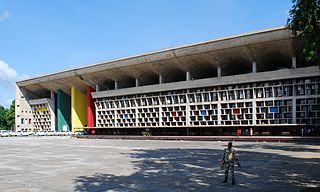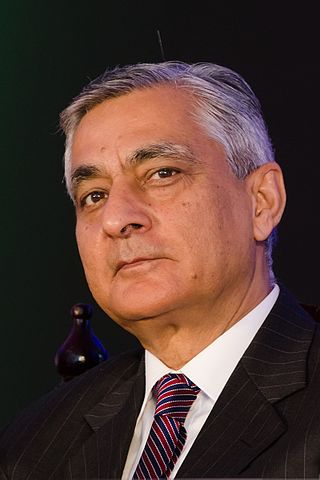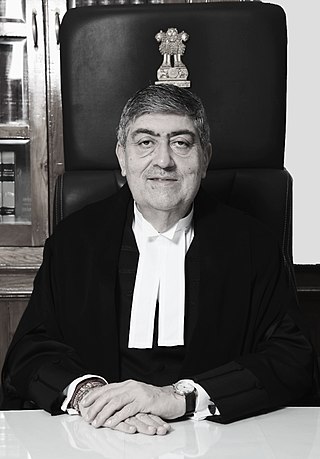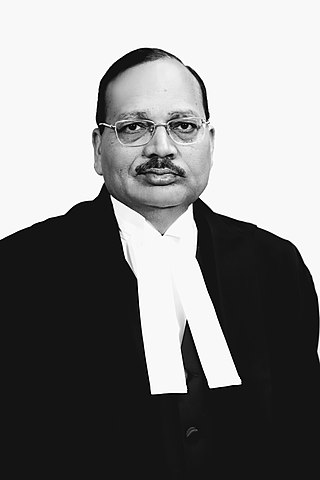Related Research Articles

Ramesh Chandra Lahoti was the 35th Chief Justice of India, serving from 1 June 2004 to 1 November 2005.

Punjab and Haryana High Court is the common High Court for the Indian states of Punjab and Haryana and the Union Territory of Chandigarh based in Chandigarh, India. Sanctioned strength of Judges of this High Court is 85 consisting of 64 Permanent Judges and 21 Additional Judges including Chief Justice. As of 14 September 2023, there are 58 Judges working in the High Court, comprising 36 Permanent and 22 Additional Judges.
The high courts of India are the highest courts of appellate jurisdiction in each state and union territory of India. However, a high court exercises its original civil and criminal jurisdiction only if the subordinate courts are not authorized by law to try such matters for lack of peculiar or territorial jurisdiction. High courts may also enjoy original jurisdiction in certain matters, if so designated, especially by the constitution, a state law or union law.
Harjit Singh Bedi is a former judge of the Supreme Court of India.
Veeraswami Ramaswami is an Indian retired judge of the Supreme Court of India and the first judge against whom removal proceedings were initiated in independent India.
Swatanter Kumar is a retired justice of the Supreme Court of India and former chairperson of the National Green Tribunal. He is also former chief justice of Bombay High Court and judge of the Delhi High Court and the Punjab and Haryana High Court.

Ranjan Gogoi is an Indian former advocate and judge who served as the 46th Chief Justice of India from 2018 to 2019, having previously served as a Judge of the Supreme Court of India from 2012 to 2018. He is currently a Member of the Rajya Sabha, having been nominated by President Ram Nath Kovind on 16 March 2020. Gogoi served as a judge in the Gauhati High Court from 2001 to 2010, and then was transferred as a judge to the Punjab and Haryana High Court from 2010 to 2011 where he later was the Chief Justice from 2011 to 2012. He is also a member of the Committee on External Affairs in the Rajya Sabha.
Arjan Kumar Sikri is an eminent jurist and a former judge of the Supreme Court of India. He was sworn in as a Supreme Court judge on 12 April 2013. Earlier, he had served as the chief justice of the Punjab and Haryana High Court. He retired as senior most puisne judge of Supreme Court of India on 6 March 2019.

Tirath Singh Thakur is an Indian jurist who served as the 43rd Chief Justice of India (CJI) from 3 December 2015 to 4 January 2017. Before being elevated to the Supreme Court, he served as the Chief Justice of Punjab and Haryana High Court from August 2008 to November 2009 .He has also served as a senior judge in Karnataka High Court from March 1994 to July 2004 and Jammu and Kashmir High Court from February to March 1994.

Surinder Singh Nijjar was a British-Indian judge of the Supreme Court of India. Post-retirement, Nijjar practised as an arbitrator. Prior to his elevation as judge, Nijjar was a Senior Advocate and practised at the Punjab and Haryana High Court.

Sanjay Kishan Kaul is a former judge and lawyer who served as a judge of the Supreme Court of India since 2017 until upon his retirement in 2023. He has served as the first puisne judge, senior-most after the Chief Justice of India. Also, he has been the ex officio executive chairman of National Legal Services Authority.
Mahesh Mittal Kumar is chairman of National Company Law Tribunal, since the body came into force. He served as 31st Chief Justice of Jammu and Kashmir High Court.

Adarsh Kumar Goel is an Indian judge. He is Chairperson of National Green Tribunal. He is former judge of the Supreme Court of India. He is also former chief justice of the Orissa High Court and Gauhati High Court, and a former judge of the Gauhati High Court and Punjab and Haryana High Court.
Sudhakar Panditrao Kurdukar is a former chief justice of the Punjab & Haryana High Court in January 1994. Later he became a judge of the Supreme Court of India in March 1996 and retired in January 2000. He was earlier a judge in the Bombay High Court. He was acting Governor of Punjab from July '94 to September '94.

Krishna Murari is a former judge of the Supreme Court of India and former chief justice of the Punjab and Haryana High Court. He has also served as a judge of the Allahabad High Court till his elevation as chief justice of the Punjab and Haryana High Court.

Suryakant Sharma is an Indian judge of the Supreme Court of India, set to become the 53rd Chief Justice of India, if the convention of seniority is followed. Prior to his elevation as judge, Kant was a Senior Advocate and also served as the Advocate General for Haryana.
Ajay Kumar Mittal is an Indian Judge. He is former Chief Justice of Madhya Pradesh High Court and Meghalaya High Court and also former Judge of Punjab and Haryana High Court.
Sir Shadi Lal was an Indian jurist. He served as the Chief justice of Lahore High Court between 1920 and 1934.
Haryana Lokayukta is the Parliamentary Ombudsman for the state of Haryana (India). It is a high level statutory functionary, created to address grievances of the public against ministers, legislators, administration and public servants in issues related to misuse of power, mal-administration and corruption. It was first formed under the Haryana Lokayukta and Deputy Lokayukta Act-2002, and approved by the president of India. The passage of Lokpal and Lokayukta's Act,2013 in Parliament had become law from January 16, 2014 and requires each state to appoint its Lokayukta within a year. A bench of Lokayukta should consist of judicial and non-judicial members. An Upa-Lokayukta is a deputy to Lokayukta and assists him in his work and acts in-charge Lokayukta in case the position fells vacant before time.
References
- ↑ "Vazifdar sworn-in as Chief Justice of Punjab & Haryana High". Business Standard India . Press Trust of India. 6 August 2016. Retrieved 24 March 2018.
- ↑ "Vazifdar sworn in as Chief Justice of Punjab & Haryana High Court". The Indian Express. 7 August 2016. Retrieved 28 February 2018.
- ↑ "Vazifdar given warm send-off". The Tribune . 4 May 2018. Retrieved 5 May 2018.
- ↑ itatonline.org (11 May 2018), Chief Justice Shiavax Jal Vazifdar Gets Warm Send Off By Bar , retrieved 24 May 2018